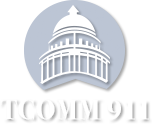When to Call 911
If there is an imminent threat to life or property, don’t hesitate — call 911
In the case of an area-wide emergency, do not use your telephone for the first few hours following the event unless you have a life-threatening emergency and need to call 911. If you must reach friends or family, call or text an out of area contact. In an area-wide emergency, such as an earthquake, the best way to help yourself and your loved ones is to be prepared by having a plan (www.co.thurston.wa.us/em) in place. Listening to a battery powered radio is the best way to get information about the emergency, and following an emergency, you can contact your local emergency management agency for recovery information.
Call First
Before you need help in an emergency, be sure to understand how the type of phone you use affects your call to 911. Cell phones may not automatically tell us where you are. Know the capabilities of the device you are using (landline, cellular, VoIP) when calling 911. If we don’t answer right away do not hang up. Stay on the line until we answer. Your ability to get through if callers repeatedly call and hang up may be delayed.
Try to stay calm, listen carefully, give information and follow all instructions. In an emergency, seconds matter, so being knowledgeable and prepared can make all the difference. Knowing when to call and what to expect when you phone 911 can help reduce fear and feelings of helplessness in an emergency.
The more you know what to expect when you call 911, the faster we can get you the help you need. If you dial 911 for a non-emergency matter, you are tying up resources that could be needed in a real emergency. Follow all instructions the call receiver gives you, and don’t hang up until the call receiver does.
Know Your Location
When calling 911, one of the first things you’ll be asked to provide is the location of the emergency you’re reporting. The call receiver may not automatically know your location or may ask you to confirm it. Tell the call receiver the location of the emergency, and provide landmarks such as cross streets and mileposts when possible. Be aware of your surroundings checking mile markers when you travel and names on billboards or signs. This could save a life when trying to get help to the correct location.
Text if You Can’t Call
 CALL IF YOU CAN — TEXT IF YOU CAN’T
CALL IF YOU CAN — TEXT IF YOU CAN’T
Text to 911 is not a replacement to a voice call to 911 in an emergency situation, but rather as an enhancement to reach 911 services in specific situations such as:
- The caller is hearing/voice impaired.
- A medical emergency that renders the person incapable of speech.
- When speaking out loud would put the caller in danger, such as a home invasion, domestic violence situation or an active shooter scenario.
- Any other emergency that makes it impossible to speak out loud.
Here are some key points you should know:
- Callers should only use texting when calling 911 is not an option.
- Using your phone to call 911 is still the most efficient way to reach emergency personnel. Texting is not always instantaneous, so if it is a life-threatening emergency, it may take longer to receive and dispatch emergency services because of the time involved. When texting, someone must enter the text, the message must go over the network and the 911 dispatcher must read the text, ask questions via text and text back.
- Text abbreviations, emoticons or slang should never be used so that the intent of the message can be as clear as possible.
- Texts to 911 have the same 160-character limit as other text messages.
- Providing the location information and nature in the first text message is critical so that help can be sent as quickly as possible, otherwise the only location we would have would be the closest cell tower to you.
- If you are not within range of the towers in Thurston County, your message may not reach 911.
- If you have Usage Controls, you should have this feature removed to ensure full text to 911 capabilities.
- Your cell phone must have the capability of sending text messages.
- Text to 911 should only be used to communicate between emergency help and the texter. No pictures, video, attachment or other recipients can be received by 911 at this time.
